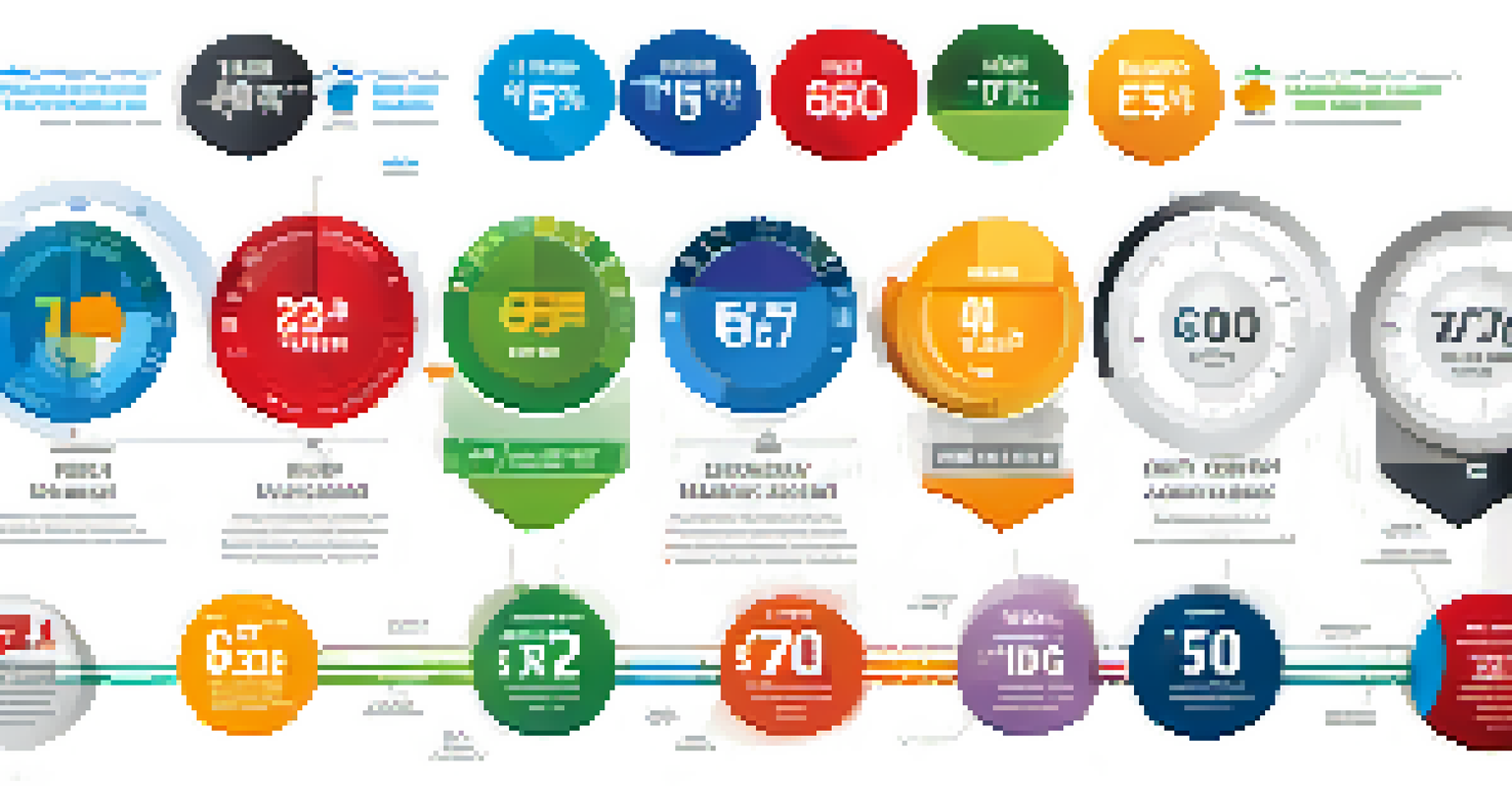Understanding the Credit Score Scale and Its Implications

What is a Credit Score and Why It Matters
A credit score is a three-digit number that reflects your creditworthiness, usually ranging from 300 to 850. This score is crucial because it helps lenders assess the risk of lending you money. Think of it as your financial report card, showing how well you've managed your debts and payments.
A credit score is like a report card for your financial health.
A higher score indicates that you're a reliable borrower, which can lead to better loan terms, lower interest rates, and even approval for credit cards. Conversely, a lower score may limit your borrowing options and lead to higher costs. Essentially, your credit score can significantly impact your financial opportunities.
Understanding your credit score empowers you to make informed decisions about your finances. By monitoring it regularly, you can identify areas for improvement and work towards achieving a score that opens doors to financial freedom.
The Ranges of the Credit Score Scale Explained
Credit scores generally fall into five categories: poor (300-579), fair (580-669), good (670-739), very good (740-799), and excellent (800-850). Each range has its implications for borrowing. For instance, a score in the 'excellent' category may qualify you for the best mortgage rates.

Understanding these ranges can help you gauge where you stand financially. If you're in the 'fair' category, you might face higher interest rates or difficulty securing loans. This awareness motivates you to take steps to improve your score.
Credit Scores Reflect Borrowing Risk
A credit score indicates your creditworthiness, influencing your ability to secure loans and favorable interest rates.
For example, if you're aiming to move from a 'fair' to a 'good' score, consider strategies like paying down debt, making payments on time, and avoiding new hard inquiries. Each small change can lead to significant improvements in your score over time.
Factors Influencing Your Credit Score
Several key factors influence your credit score, including payment history, credit utilization, length of credit history, types of credit, and recent inquiries. Payment history is the most critical, accounting for about 35% of your score. Missing payments can have a lasting negative impact.
It's not about how much money you make; it's about how well you manage it.
Credit utilization, or the ratio of your current credit card balances to your credit limits, also plays a significant role. Keeping this ratio below 30% is generally recommended to positively influence your score. This means if your limit is $10,000, you should aim to keep your balance under $3,000.
Additionally, the length of your credit history matters. A longer history can demonstrate stability and reliability to lenders. It's beneficial to keep older accounts open, even if you don't use them regularly, as they contribute positively to your overall credit profile.
The Importance of Payment History
Payment history is the most significant factor in determining your credit score. It reflects whether you pay your bills on time, which is crucial for establishing trust with lenders. Even one late payment can negatively impact your score for years.
To maintain a positive payment history, consider setting up automatic payments or reminders. This way, you won't miss due dates, which can lead to late fees and lowered scores. Additionally, addressing any past due accounts promptly can help mitigate damage.
Payment History is Crucial
Your payment history significantly impacts your credit score, making timely payments essential for financial health.
Remember, consistent on-time payments not only boost your credit score but also demonstrate financial responsibility. This reliability can make you a more attractive candidate for loans or credit in the future.
Credit Utilization: A Key to a Healthy Score
Credit utilization measures how much of your available credit you're using. It's recommended to keep this ratio below 30% to maintain a healthy credit score. For example, if you have a total credit limit of $10,000, try to keep your outstanding balance under $3,000.
High credit utilization can signal to lenders that you're over-reliant on credit, which may increase your perceived risk. This can lead to higher interest rates or even denial of credit applications. Therefore, it's wise to monitor and manage your credit utilization actively.
To improve your utilization, you can pay down existing balances, request a credit limit increase, or open a new credit line—just ensure you do this responsibly. The goal is to maintain a balance that reflects responsible credit management.
Understanding the Impact of Hard Inquiries
When you apply for credit, lenders often conduct a hard inquiry to assess your creditworthiness, which can temporarily lower your score. Each hard inquiry can reduce your score by a few points for about a year. Therefore, it's essential to be mindful of how often you apply for new credit.
While some inquiries are unavoidable, such as when shopping for a mortgage, you can minimize their impact by spreading out applications over time. For instance, if you're considering multiple credit options, try to make all inquiries within a short period to limit their effect on your score.
Manage Credit Utilization Wisely
Keeping your credit utilization below 30% is key to maintaining a healthy credit score and demonstrating responsible credit use.
On the flip side, soft inquiries—like checking your own credit—don’t affect your score. Regularly monitoring your credit can help you stay informed and ready to address any potential issues before they become significant problems.
Steps to Improve Your Credit Score
Improving your credit score is achievable with a few strategic steps. Start by checking your credit report for errors and disputing any inaccuracies you find. Errors can drag down your score unnecessarily, so ensuring your report is accurate is crucial.
Next, focus on making timely payments and reducing your credit utilization. Set up reminders or automatic payments to avoid missed deadlines. Additionally, consider paying down high-interest debts first to relieve financial pressure.

Lastly, be patient. Building or repairing your credit score takes time, but with consistent effort, you’ll likely see improvements. Celebrate small victories along the way, as each step brings you closer to a score that opens more financial opportunities.